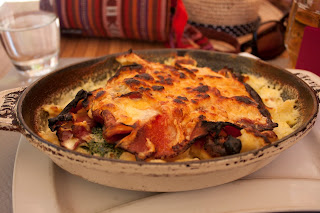Tarte flambée
Also known as flammekueche in Alsatian and Flammkuchen in German. This is a cousin of the pizza, though is distinctive in the use of crème fraîche in place of tomato and typically a thinner base than a pizza. The toppings I saw were some combination of onion, lardons, mushrooms and munster cheese. The bread dough is leavened, with some recipes I've seen using bakers yeast and others using beer, though bizarrely the recipes didn't remember to mention not to use pasteurized beer.We had them a few times on our trip, but look pretty much identical.
If you fancy one and you live in London, visit Flammbelle at the (up)market in the Truman brewery building on Brick Lane on a Sunday.
Spaetzle
Spaetzle or Spätzle is an egg pasta, which is common across Alsace, Germany, Austria, Switzerland and Hungary under various names. Properly made, there should be 7 eggs to every kilogram of wheat. It has more flavour than most pasta and feels a little denser. The pasta is formed in a variety of ways, such as using a special grater or forcing the dough through a colander. It has a nice flavour in its own right that is akin to yorkshire pudding. Different restaurants sell spaetzle in a variety of styles and thicknesses and ranged from very thick long noodles to thinner trofie style pieces and gnocci esque balls.I tried it with meat and a sauce and as a gratin - my favourite serving was with a turkey schnitzel and some pepper sauce.
 |
| Meat balls and mustard sauce |
 |
| With lardons |
 |
| Gnocci style as a gratin with ham, munster cheese and spinach |
 |
| In Germany, schnitzel with a side helping of pepper sauce (not shown) |
Choucroute
More properly, choucroute garnie - or dressed sauerkraut. Essentially this is some sauerkraut served with various cuts of pork and served with potatoes. However, this doesn't do this justice - the sauerkraut is heated in some wine, typically a local Riesling layered with the pork and baked in a casserole dish.
The best choucroute I had was at the Hôtel De Rohan (first photo below) - the inclusion of a roasted ham hock was a particularly tasty addition but what made it was the colouring on the sauerkraut (not visible) where it had caught on the bottom of casserole which gave some variety to the very large quantity of cabbage.
Galettes de pommes de terre
The galette de pommes de terre doesn't appear to have a standard recipe and exist on the continuum of potato pancakes. The ones we had tasted like they had flour and eggs in them with a doughy texture, whilst some recipes I've looked at are indistinguishable from a simple grated rösti. The rösti we tried in Germany was rather good, served with pork in a red wine sauce.
 |
| Galettes de pommes de terre au jambon fumé et au munster (potato pancake with smoked ham and munster cheese) |
 |
| Rösti with pork in Germany |
Best of the rest
We had a few other interesting dishes which I don't think you'd commonly get in the UK. First up was this salade ancienne, which is basically a pile of cold leftovers from a pot au feu (a very simple traditional stew) served with some grated cabbage, carrot and potato. In the hot summer sun, it was a refreshing lunch time meal.After my salad, I couldn't decide on a dessert, so I went for a gourmet coffee, which is a coffee...but with four desserts - I would quite happily see this introduced into the UK. I got a creme brulee, a macaroon, a fruit brochette, a slab of mousse and to my delight, a traditional British trifle.
And finally, what trip to France would be complete without a diabolo in this case, mint. Slightly odd, but quite enjoyable. Other syrup based beverages sampled included a Monaco - a lager shandy with grenadine.













